Fleurs du Mal Magazine



Lovers
I thought, because we had been friends so long,
That I knew all your dear lips dared intend
Before they dawned to speech. Our thoughts would blend,
I dreamed, like memories that faintly throng.
Your voice dwelt in me like an olden song.
Petal, I thought, from petal I could rend
The blossom of your soul, and at the end
Find still the same sweet fragrance. I was wrong.
Last evening in our eyes love brimmed to birth;
Our friendship faded, lost in passion’s mist.
We had been strangers only! Here, close-caught
Against my heart the dim face I had sought
So long! And now the only thing on earth—
Your piteous mouth, a-tremble to be kissed!
Arthur Adams
(1872-1936)
Lovers
• fleursdumal.nl magazine
More in: Adams, Arthur, Archive A-B, Archive A-B

A Fairy Tale
All things grew upwards, foul and fair:
The great trees fought and beat the air
With monstrous wings that would have flown;
But the old earth clung to her own,
Holding them back from heavenly wars,
Though every flower sprang at the stars.
But he broke free: while all things ceased,
Some hour increasing, he increased.
The town beneath him seemed a map,
Above the church he cocked his cap,
Above the cross his feather flew
Above the birds and still he grew.
The trees turned grass; the clouds were riven;
His feet were mountains lost in heaven;
Through strange new skies he rose alone,
The earth fell from him like a stone,
And his own limbs beneath him far
Seemed tapering down to touch a star.
He reared his head, shaggy and grim,
Staring among the cherubim;
The seven celestial floors he rent,
One crystal dome still o’er him bent:
Above his head, more clear than hope,
All heaven was a microscope.
G. K. Chesterton
(1874-1936)
A Fairy Tale
• fleursdumal.nl magazine
More in: Archive C-D, Chesterton, Gilbert Keith, G.K. Chesterton, Grimm, Andersen e.o.: Fables, Fairy Tales & Stories
Auschwitz. Hiroshima. Cambodia’s killing fields. The World Trade Center. The mass graves of Rwanda.
These places of violent death have become part of the recreational landscape of tourism, an industry that is otherwise dedicated to pleasure and escape. In dark places like concentration camps, prisons, battlegrounds, and the sites of natural disasters, how are memory and trauma mediated by thanotourism, or tourism of death?
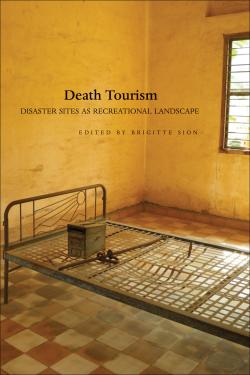 In Death Tourism, Brigitte Sion brings together essays by some of the most trenchant voices in the field to look at the tensions created by the juxtaposition of human remains and food stands, political agendas and educational programs, economic development and architectural ambition.
In Death Tourism, Brigitte Sion brings together essays by some of the most trenchant voices in the field to look at the tensions created by the juxtaposition of human remains and food stands, political agendas and educational programs, economic development and architectural ambition.
How does a state redefine its national identity after catastrophic trauma?
And what is the role of this kind of tourism in defining their new identity?
A timely volume on an irresistible subject, this inquiry exposes the intersection of leisure with the inhumane, giving insight into how people respectfully share a public space that is both free and sacred, compelling and tragic.
Death Tourism.
Disaster Sites as Recreational Landscape
Edited by Brigitte Sion
Seagull Books
Publication Year: 2014
Format: Paperback
Pages: 356
illustrations
2014
ISBN: 9780857421074
$35
# new books
Death Tourism.
Disaster Sites as Recreational Landscape
by Brigitte Sion
• fleursdumal.nl magazine
More in: - Book News, - Bookstores, Archive S-T, Art & Literature News, AUDIO, CINEMA, RADIO & TV, CRIME & PUNISHMENT, Galerie des Morts, Holocaust, REPRESSION OF WRITERS, JOURNALISTS & ARTISTS, WAR & PEACE
Erasmus is een van de grootste auteurs van Nederland en België, en zelfs van heel Europa.
Hij verpersoonlijkt de overgang van de middeleeuwen naar de moderne tijd. Zijn betekenis voor de literatuur- én wetenschapsgeschiedenis is immens.
Erasmus’ duizenden brieven over onderwerpen als gewetensdwang en drukpersvrijheid hebben niets aan zeggingskracht ingeboet.
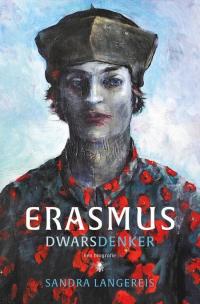 Het grootste deel van Erasmus’ leven en werk bleef tot nu toe onderbelicht. Sandra Langereis is de eerste biograaf die zijn levensverhaal recht doet door zijn enorme briefwisseling op de voet te volgen en de wording van zijn complete literaire erfenis te beschrijven. Ze toont hem als de sprankelende auteur van de Lof der zotheid en als brutale bijbel-wetenschapper die het net zo hevig aan de stok kreeg met inquisiteurs als met Luther.
Het grootste deel van Erasmus’ leven en werk bleef tot nu toe onderbelicht. Sandra Langereis is de eerste biograaf die zijn levensverhaal recht doet door zijn enorme briefwisseling op de voet te volgen en de wording van zijn complete literaire erfenis te beschrijven. Ze toont hem als de sprankelende auteur van de Lof der zotheid en als brutale bijbel-wetenschapper die het net zo hevig aan de stok kreeg met inquisiteurs als met Luther.
Erasmus’ levensverhaal werpt licht op een bewogen tijdvak: een eeuw van felle humor en grof geweld, van religieus fanatisme en strijd voor intellectuele vrijheid. Deze rijke biografie maakt de actualiteit van geschiedenis invoelbaar.
Nooit kwam Erasmus geestiger, slimmer, scherper, dapperder, dwarser, bozer, banger en, in één woord, menselijker in beeld. En niet eerder werd Erasmus’ tijd levendiger voor het voetlicht gebracht dan in deze biografie. Een indringend en ongekend compleet portret van Erasmus.
Sandra Langereis is historicus, biograaf en schrijver. Haar vorige biografie, De woordenaar, over drukker en uitgever Christoffel Plantijn, werd genomineerd voor de Libris Geschiedenis Prijs en door de Volkskrant en Trouw verkozen tot beste biografie en beste geschiedenisboek van 2014.
Dit jaar ontvangt Sandra Langereis de Libris Geschiedenis Prijs 2021 voor haar boek over Erasmus.
 ‘Een boek dat’, aldus de jury, ‘op alle fronten uitblinkt. Een boek dat stoelt op briljant wetenschappelijk onderzoek, dat ondanks zijn omvang tot aan het eind toe meeslepend is, een boek dat je omver blaast.’ Juryvoorzitter Khadija Arib maakte de prijswinnaar van het beste historische boek van 2021 bekend tijdens een speciale live-uitzending van radioprogramma OVT. Aan de Libris Geschiedenis Prijs is een bedrag van 20.000 euro verbonden.
‘Een boek dat’, aldus de jury, ‘op alle fronten uitblinkt. Een boek dat stoelt op briljant wetenschappelijk onderzoek, dat ondanks zijn omvang tot aan het eind toe meeslepend is, een boek dat je omver blaast.’ Juryvoorzitter Khadija Arib maakte de prijswinnaar van het beste historische boek van 2021 bekend tijdens een speciale live-uitzending van radioprogramma OVT. Aan de Libris Geschiedenis Prijs is een bedrag van 20.000 euro verbonden.
De Libris Geschiedenis Prijs bekroont historische boeken die een algemeen publiek aanspreken. Oorspronkelijkheid, leesbaarheid en historische degelijkheid zijn de belangrijkste criteria. De prijs is een initiatief van Historisch Nieuwsblad, Libris, Nederlands Openluchtmuseum, Rijksmuseum Amsterdam, VPRO en Trouw. De prijs is onderdeel van de Maand van de Geschiedenis en wordt traditiegetrouw eind oktober uitgereikt, dit jaar alweer voor de vijftiende keer. Met deze prijs willen de initiatiefnemers een stimulans geven aan het goede historische boek in Nederland.
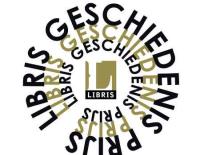 De Libris Geschiedenisprijs wordt elk jaar uitgereikt aan de auteur van een historisch boek dat een algemeen publiek aanspreekt. Het boek moet een oorspronkelijk onderwerp hebben, prettig leesbaar zijn en op gedegen historisch onderzoek stoelen. Aan de prijs is een bedrag van € 20.000,- verbonden. Eerder wonnen Pieter van Os (2020), Roelof van Gelder (2019), Frits van Oostrom (2018), Carolijn Visser (2017), Elisabeth Leijnse (2016), Alexander Münninghoff (2015), Dik van der Meulen (2014), Martin Bossenbroek (2013), Bart van den Boom (2012), Jaap Scholten (2011), David Van Reybrouck (2010), Jolande Withuis (2009), Luuc Kooijmans (2008) en Auke van der Woud (2007) de prijs.
De Libris Geschiedenisprijs wordt elk jaar uitgereikt aan de auteur van een historisch boek dat een algemeen publiek aanspreekt. Het boek moet een oorspronkelijk onderwerp hebben, prettig leesbaar zijn en op gedegen historisch onderzoek stoelen. Aan de prijs is een bedrag van € 20.000,- verbonden. Eerder wonnen Pieter van Os (2020), Roelof van Gelder (2019), Frits van Oostrom (2018), Carolijn Visser (2017), Elisabeth Leijnse (2016), Alexander Münninghoff (2015), Dik van der Meulen (2014), Martin Bossenbroek (2013), Bart van den Boom (2012), Jaap Scholten (2011), David Van Reybrouck (2010), Jolande Withuis (2009), Luuc Kooijmans (2008) en Auke van der Woud (2007) de prijs.
Erasmus: dwarsdenker
Een biografie
Auteur: Sandra Langereis
ISBN: 9789403120317
NUR: 321
Gebonden
Aantal pagina’s: 784
Uitgever: De Bezige Bij
Verschijningsdatum: 04-03-2021
Prijs: 39,99
• fleursdumal.nl magazine
More in: #Biography Archives, - Book News, - Bookstores, Archive E-F, Awards & Prizes, Desiderius Erasmus, MONTAIGNE
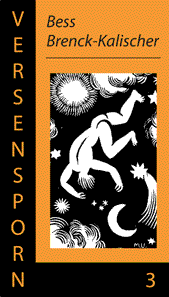
Das Auge flog voran
Das Auge flog voran.
Im Stern verstrickt der Fuß.
Die hingerissene Sonne
Sinkt im Spiegel.
Um jede Wassermühle
Blutet Licht.
Bess Brenck-Kalischer
(Betty Levy, 1878-1933)
Das Auge flog voran
• fleursdumal.nl magazine
More in: # Classic Poetry Archive, Archive A-B, Archive A-B
Like Richard Ellmann’s James Joyce, Richard Zenith’s Pessoa immortalizes the life of one of the twentieth century’s greatest writers.
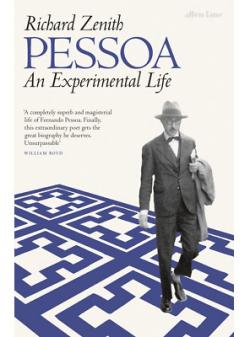 Nearly a century after his wrenching death, the Portuguese poet Fernando Pessoa (1888–1935) remains one of our most enigmatic writers. Believing he could do “more in dreams than Napoleon,” yet haunted by the specter of hereditary madness, Pessoa invented dozens of alter egos, or “heteronyms,” under whose names he wrote in Portuguese, English, and French.
Nearly a century after his wrenching death, the Portuguese poet Fernando Pessoa (1888–1935) remains one of our most enigmatic writers. Believing he could do “more in dreams than Napoleon,” yet haunted by the specter of hereditary madness, Pessoa invented dozens of alter egos, or “heteronyms,” under whose names he wrote in Portuguese, English, and French.
Unsurprisingly, this “most multifarious of writers” (Guardian) has long eluded a definitive biographer—but in renowned translator and Pessoa scholar Richard Zenith, he has met his match.
Relatively unknown in his lifetime, Pessoa was all but destined for literary oblivion when the arc of his afterlife bent, suddenly and improbably, toward greatness, with the discovery of some 25,000 unpublished papers left in a large, wooden trunk. Drawing on this vast archive of sources as well as on unpublished family letters, and skillfully setting the poet’s life against the nationalist currents of twentieth-century European history, Zenith at last reveals the true depths of Pessoa’s teeming imagination and literary genius.
Much as Nobel laureate José Saramago brought a single heteronym to life in The Year of the Death of Ricardo Reis, Zenith traces the backstories of virtually all of Pessoa’s imagined personalities, demonstrating how they were projections, spin-offs, or metamorphoses of Pessoa himself. A solitary man who had only one, ultimately platonic love affair, Pessoa used his and his heteronyms’ writings to explore questions of sexuality, to obsessively search after spiritual truth, and to try to chart a way forward for a benighted and politically agitated Portugal.
Although he preferred the world of his mind, Pessoa was nonetheless a man of the places he inhabited, including not only Lisbon but also turn-of-the-century Durban, South Africa, where he spent nine years as a child. Zenith re-creates the drama of Pessoa’s adolescence—when the first heteronyms emerged—and his bumbling attempts to survive as a translator and publisher.
Zenith introduces us, too, to Pessoa’s bohemian circle of friends, and to Ophelia Quieroz, with whom he exchanged numerous love letters.
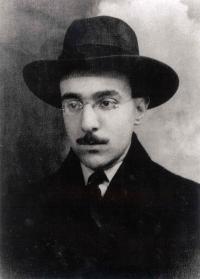 Pessoa reveals in equal force the poet’s unwavering commitment to defending homosexual writers whose books had been banned, as well as his courageous opposition to Salazar, the Portuguese dictator, toward the end of his life. In stunning, magisterial prose, Zenith contextualizes Pessoa’s posthumous literary achievements—especially his most renowned work, The Book of Disquiet.
Pessoa reveals in equal force the poet’s unwavering commitment to defending homosexual writers whose books had been banned, as well as his courageous opposition to Salazar, the Portuguese dictator, toward the end of his life. In stunning, magisterial prose, Zenith contextualizes Pessoa’s posthumous literary achievements—especially his most renowned work, The Book of Disquiet.
A modern literary masterpiece, Pessoa simultaneously immortalizes the life of a literary maestro and confirms the enduring power of Pessoa’s work to speak prophetically to the disconnectedness of our modern world.
Richard Zenith (1956, Washington, D.C.) is an American-Portuguese writer and translator, winner of Pessoa Prize in 2012.
Pessoa
A Biography
by Richard Zenith (Author)
Published by Liveright
July 20, 2021
Language : English
Hardcover : 1088 pages
ISBN-10 : 0871404710
ISBN-13 : 978-0871404718
$40.00
# new biography
Fernando Pessoa
Richard Zenith
• fleursdumal.nl magazine
More in: #Biography Archives, #Editors Choice Archiv, - Book News, - Bookstores, Archive O-P, Archive Y-Z, Art & Literature News, Pessoa, Fernando, TRANSLATION ARCHIVE
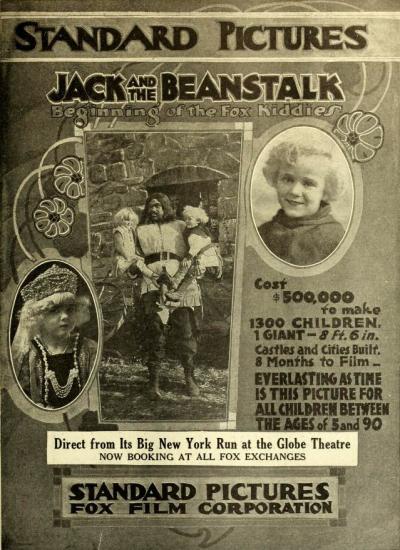
Jack And The Bean-Stalk
A lazy and careless boy was Jack,–
He would not work, and he would not play;
And so poor, that the jacket on his back
Hung in a ragged fringe alway;
But ’twas shilly-shally, dilly-dally,
From day to day.
At last his mother was almost wild,
And to get them food she knew not how;
And she told her good-for-nothing child
To drive to market the brindle cow.
So he strolled along, with whistle and song,
And drove the cow.
A man was under the wayside trees,
Who carried some beans in his hand–all white.
He said, “My boy, I’ll give you these
For the brindle cow.” Jack said, “All right.”
And, without any gold for the cow he had sold,
Went home at night.
Bitter tears did the mother weep;
Out of the window the beans were thrown,
And Jack went supperless to sleep;
But, when the morning sunlight shone,
High, and high, to the very sky,
The beans had grown.
They made a ladder all green and bright,
They twined and crossed and twisted so;
And Jack sprang up it with all his might,
And called to his mother down below:
“Hitchity-hatchet, my little red jacket,
And up I go!”
High as a tree, then high as a steeple,
Then high as a kite, and high as the moon,
Far out of sight of cities and people,
He toiled and tugged and climbed till noon;
And began to pant: “I guess I shan’t
Get down very soon!”
At last he came to a path that led
To a house he had never seen before;
And he begged of a woman there some bread;
But she heard her husband, the Giant, roar,
And she gave him a shove in the old brick oven,
And shut the door.
And the Giant sniffed, and beat his breast,
And grumbled low, “Fe, fi, fo, fum!”
His poor wife prayed he would sit and rest,–
“I smell fresh meat! I will have some!”
He cried the louder, “Fe, fi, fo, fum!
I will have some.”
He ate as much as would feed ten men,
And drank a barrel of beer to the dregs;
Then he called for his little favorite hen,
As under the table he stretched his legs,–
And he roared “Ho! ho!”–like a buffalo–
“Lay your gold eggs!”
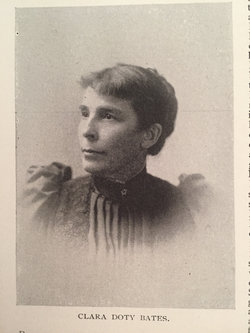
She laid a beautiful egg of gold;
And at last the Giant began to snore;
Jack waited a minute, then, growing bold,
He crept from the oven along the floor,
And caught the hen in his arms, and then
Fled through the door.
But the Giant heard him leave the house,
And followed him out, and bellowed “Oh-oh!”
But Jack was as nimble as a mouse,
And sang as he rapidly slipped below:
“Hitchity-hatchet, my little red jacket,
And down I go!”
And the Giant howled, and gnashed his teeth.
Jack got down first, and, in a flash,
Cut the ladder from underneath;
And Giant and Bean-stalk, in one dash,–
No shilly-shally, no dilly-dally,–
Fell with a crash.
This brought Jack fame, and riches, too;
For the little gold-egg hen would lay
An egg whenever he told her to,
If he asked one fifty times a day.
And he and his mother lived with each other
In peace alway.
Clara Doty Bates
(1838 – 1895)
Jack And The Bean-Stalk
Versified by Mrs. Clara Doty Bates
fleursdumal.nl magazine
More in: Archive A-B, Archive A-B, Bates, Clara Doty, Children's Poetry, Grimm, Andersen e.o.: Fables, Fairy Tales & Stories, Tales of Mystery & Imagination
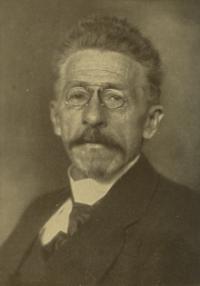
Ganz still zuweilen . . .
Ganz still zuweilen wie ein Traum
klingt in dir auf ein fernes Lied…
Du weißt nicht, wie es plötzlich kam,
du weißt nicht, was es von dir will…
und wie ein Traum ganz leis und still
verklingt es wieder, wie es kam…
Wie plötzlich mitten im Gewühl
der Straße, mitten oft im Winter
ein Hauch von Rosen dich umweht,
wie oder dann und wann ein Bild
aus längst vergessenen Kindertagen
mit fragenden Augen vor dir steht…
Ganz still und leise, wie ein Traum…
Du weißt nicht, wie es plötzlich kam,
du weißt nicht, was es von dir will,
und wie ein Traum ganz leis und still
verblaßt es wieder, wie es kam.
Cäsar Flaischlen
(1864-1920)
Ganz still zuweilen . . .
• fleursdumal.nl magazine
More in: # Classic Poetry Archive, Archive E-F, Archive E-F
The long-awaited autobiography of the legendary Nirvana and Foo Fighters rock star, Dave Grohl.
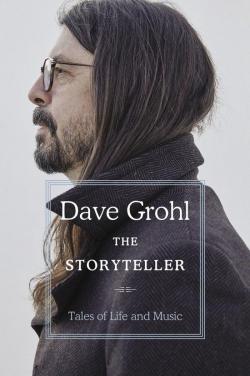 So, I’ve written a book. Having entertained the idea for years, and even offered a few questionable opportunities (‘It’s a piece of cake! Just do four hours of interviews, find someone else to write it, put your face on the cover, and voila!’), I have decided to write these stories just as I have always done, in my own hand.
So, I’ve written a book. Having entertained the idea for years, and even offered a few questionable opportunities (‘It’s a piece of cake! Just do four hours of interviews, find someone else to write it, put your face on the cover, and voila!’), I have decided to write these stories just as I have always done, in my own hand.
The joy that I have felt from chronicling these tales is not unlike listening back to a song that I’ve recorded and can’t wait to share with the world, or reading a primitive journal entry from a stained notebook, or even hearing my voice bounce between the Kiss posters on my wall as a child. This certainly doesn’t mean that I’m quitting my day job, but it does give me a place to shed a little light on what it’s like to be a kid from Springfield, Virginia, walking through life while living out the crazy dreams I had as young musician.
From hitting the road with Scream at 18 years old, to my time in Nirvana and the Foo Fighters, jamming with Iggy Pop or playing at the Academy Awards or dancing with AC/DC and the Preservation Hall Jazz Band, drumming for Tom Petty or meeting Sir Paul McCartney at Royal Albert Hall, bedtime stories with Joan Jett or a chance meeting with Little Richard, to flying halfway around the world for one epic night with my daughters…the list goes on. I look forward to focusing the lens through which I see these memories a little sharper for you with much excitement.
Dave Grohl is an award-winning musician and director. He has been one of the most beloved and respected figures on the international music since his recorded debut with Nirvana on 1991’s generation-defining Nevermind. Grohl took centre stage with Foo Fighters’ 1995 self-titled debut album, and the band have gone on to win twelve Grammys and five Brit Awards. Their most recent album, Medicine at Midnight, went to No 1 on the UK charts. In 2013, Grohl made his debut as a feature director/producer with the acclaimed documentary Sound City. Grohl also directed the eight-part HBO docuseries Foo Fighters: Sonic Highways, which premiered in October 2014 and went on to win two Emmys.
The Storyteller,
Tales of Life and Music
by Dave Grohl
5 Oct. 2021
Publisher: Simon & Schuster UK
Language: English
Hardcover: 384 pages
ISBN-10 : 1398503703
ISBN-13 : 978-1398503700
Dimensions: 15.3 x 3.25 x 23.4 cm
€ 26,95
#new books
Dave Grohl
The Storyteller
• fleursdumal.nl magazine
More in: # Music Archive, #Biography Archives, - Book News, - Bookstores, Archive G-H
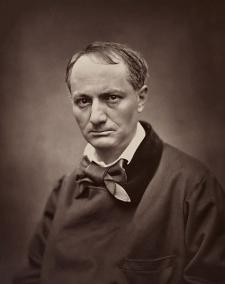
Sonnet d’automne
Ils me disent, tes yeux, clairs comme le cristal:
«Pour toi, bizarre amant, quel est donc mon mérite?»
— Sois charmante et tais-toi! Mon coeur, que tout irrite,
Excepté la candeur de l’antique animal,
Ne veut pas te montrer son secret infernal,
Berceuse dont la main aux longs sommeils m’invite,
Ni sa noire légende avec la flamme écrite.
Je hais la passion et l’esprit me fait mal!
Aimons-nous doucement. L’Amour dans sa guérite,
Ténébreux, embusqué, bande son arc fatal.
Je connais les engins de son vieil arsenal:
Crime, horreur et folie! — Ô pâle marguerite!
Comme moi n’es-tu pas un soleil automnal,
Ô ma si blanche, ô ma si froide Marguerite?
Charles Baudelaire
(1821 – 1867)
Sonnet d’automne
Fleurs du mal (Flowers of Evil)
• fleursdumal.nl magazine
More in: Archive A-B, Archive A-B, Baudelaire, Les Fleurs du Mal

China 1899
She lies, a grave disdain all her defence,
Too imperturbable for scorn. She hears
Only the murmur of the flowing years
That thunder slowly on her shores immense
And ebb away in moaning impotence.
Giants enduring, she and Time are peers—
Her dream-hazed eyes knowing no hopes, no tears,
Her glance a langour-lidded insolence.
And though the rabble of the restless West
In her deserted courts set their rash sway,
She heeds them not; as when the sun, withdrawn
From his untarnished sky, knows it distressed
By storm of weakling stars, that he at dawn
Will wither with one ruthless glance away.
Arthur Adams
(1872-1936)
China 1899
• fleursdumal.nl magazine
More in: Adams, Arthur, Archive A-B, Archive A-B
Vincent Berquez is a poet and artist, living in London with his wife and son. He was born to French parents and attended the French Lycée and Cannock boarding school.
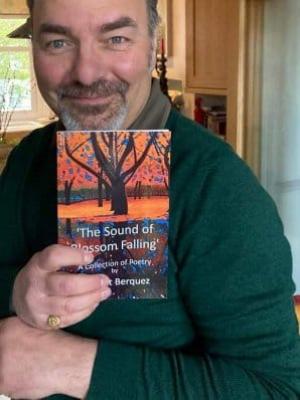 Berquez studied Fine Art at Goldsmith’s; followed by The Camden Institute, where he was taught by Frank Auerbach.
Berquez studied Fine Art at Goldsmith’s; followed by The Camden Institute, where he was taught by Frank Auerbach.
He worked as an artist for many years prior to studying museology and conservation at London University following which he worked as a curator and conserver at various institutions, including the British Museum, and the Louvre.
Berquez has published in Britain, Europe, America and New Zealand. His work is in many anthologies, collections and magazine worldwide. Vincent Berquez was requested to write a Tribute as part of ‘Poems to the American People’ for the Hastings International Poetry Festival for 9/11, read by the mayor of New York at the podium.
He has also been commissioned to write an eulogy by the son of Chief Albert Nwanzi Okoluko, the Ogimma Obi of Ogwashi-Uku to commemorate the death of his father.
Vincent Berquez has been a judge many times, including for Manifold Magazine and had work read as part of Manifold Voices at Waltham Abbey. He has recited many times, including at The Troubadour and the Pitshanger Poets, in London. In 2006 his name was put forward with the Forward Prize for Literature. Recently he was awarded a prize with Decanto Magazine. Berquez is now a member of London Voices who meet monthly in London, U.K
Berquez has also been collaborating in 07/08 with a Scottish composer and US film maker to produce a song-cycle of seven of his poems for mezzo-soprano and solo piano. These are being recorded at the Royal College of Music under the directorship of the concert pianist, Julian Jacobson. In 2009 he contributed 5 poems for the edition of A Generation Defining Itself, as well as 3 poems for Eleftheria Lialios’s book on wax dolls published in Chicago. He also made poetry films that have been shown at various venues, including a Polish/British festival in London, Jan 07.
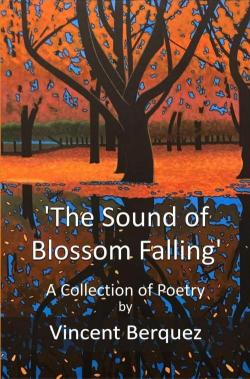 As an artist Vincent Berquez has exhibited world wide, winning prizes, such as at the Novum Comum 88’ Competition in Como, Italy. He has also worked with an art’s group, called Eins von Hundert, from Cologne, Germany for over 16 years. Berquez has shown his work at the Institute of Art in Chicago, US, as well as many galleries and institutions worldwide.
As an artist Vincent Berquez has exhibited world wide, winning prizes, such as at the Novum Comum 88’ Competition in Como, Italy. He has also worked with an art’s group, called Eins von Hundert, from Cologne, Germany for over 16 years. Berquez has shown his work at the Institute of Art in Chicago, US, as well as many galleries and institutions worldwide.
Recently he showed his paintings at the Lambs Conduit Festival, he took part in a group show called Gazing on Salvation, reciting his poetry for Lent and exhibiting paintings/collages.
He had a one-man show at Sacred Spaces Gallery with his Christian collages in 2007. In 2008 Vincent Berquez had a solo show of paintings at The Foundlings Museum and in 2011 an exposition with new work in Langham Gallery London.
Vincent Berquez has published regularly in fleursdumal.nl magazine for many years.
His book of poetry, called: The Sound of Blossom Falling, was recently published by CyberWit in London.
“The main point about these poems is deep emotion and concrete theme. We notice very impressive ardour of imagination in these poem.”
The Sound of Blossom falling
He talks of her with the simple love of a father,
describing how they walked the verdant path
and along the softness of the hardy hills
entwined in each other’s presence.
He feeds the dialogue of his love of nature
as he gazes and points out
the crisp colours and myriad greens –
he asks if she sees what he sees,
if she hears what he hears –
and as she looks and thinks
with a bright child’s mind
she says ‘I can hear the sound of blossom falling.’
They both stand still and listen for a moment.
The Sound of Blossom Falling
Author: Vincent Berquez
Poetry
Binding: Paperback
Language: English
86 pages
Publisher: Cyberwit.net
Pub. Date: 2021
ISBN-10: 9390601096
ISBN-13: 978-9390601097
Dimensions: 13.97 x 0.56 x 21.59 cm
£10.89
• fleursdumal.nl magazine
More in: #Editors Choice Archiv, - Book News, - Bookstores, Archive A-B, Archive A-B, Berquez, Vincent
Thank you for reading Fleurs du Mal - magazine for art & literature